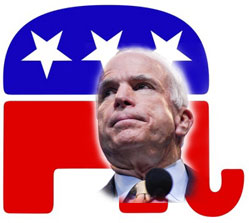Historically, Republican political philosophy and African American advancement have been in accord. Why not now?

Foundered in the 1850s by industrial and anti-slavery activists, the Republican Party has helped Black Americans’ advancement from the beginning. In the 1860s Abraham Lincoln and Republicans worked to pass the Thirteenth Amendment, which outlawed slavery, the Fourteenth, which guaranteed equal protection under the laws, and the Fifteenth, which helped Blacks secure voting rights.
In return, Blacks overwhelmingly voted Republican for 90 years. The Republican philosophy of maximizing economic liberty through free enterprise, individualism and free markets were positions advocated by giants such as Frederick Douglass and Booker T. Washington.
From 1868 to 1901 more than 500 Southern Black Republicans were elected to office at the Senate, House of Representatives, and state senate and assembly levels. Republicans remained the overwhelming political choice of Black voters until the 1930s when the Democratic Party’s “New Deal” offered them government support for civil rights. But, through the 1950s and ‘60s presidencies of Dwight Eisenhower and Richard Nixon, Republicans remained competitive among Blacks. President Eisenhower played a pivotal role in the Little Rock 9 epic and eliminated segregation in the military.
Nixon’s implementation of “Black Capitalism” built a generation of Black millionaires and Black pride, jobs and opportunities in constructive ways.
Since Nixon captured 32 percent of the Black Vote, “Here’s your hat” has been the Republicans’ tone toward Blacks. Over the last 40 years Republicans acquired a reputation among Black Americans of racial exclusion, neglect and race baiting.
During recent decades, Republicans have garnered less than 15 percent of Black votes in major political contests.
But, instead of “reaching out” to Blacks of similar political interests, GOP campaign operatives have avoided traditional Black institutions, and in some instances actively engaged in acts to mute Black electoral votes.
The 2008 presidential elections present an interesting conundrum for the Republican Party apparatus. John McCain, the presumptive GOP nominee, could actually capture a substantial percentage of the Black Vote if they went back to their roots. Even under current circumstances, the time could be ripe for Republicans. Many affluent Black families started in the 1960s and Democrats actually have no record of spurring similar advancement to rival Nixon’s era of Black Capitalism. Barack Obama makes no promises to Blacks. If Republican brass pays attention to the potential of capturing Black votes, they’ll change party practices and position themselves to seek, and win, 30 percent of Black votes.
The “One Man Band” Republicans have put on the McCain trail is South Carolina National Committeeman Glen McCall. McCall is the first Black from that state to serve on the Republican National Committee. One of three Blacks on the RNC’s 168-member body responsible for party platforms and activities, McCall will act as a surrogate for presidential candidate McCain among Blacks and represent the party in media appearances. McCain/McCall will find many Blacks agree with them on issues from vouchers, to urban enterprise zones, etc., but this single-minded approach is more symbol than substance. To get Black voters, the GOP will have to make more than one footprint. If McCain and McCall simply two-step off to NAACP and Urban League Conventions, continuing RNC indifference to traditional Black organizations and media they’ll miss out again.
John McCain has a zero relationship with Blacks. To duplicate successes of old, McCain & Company must increase their interests and understanding of Blacks. With Black institutions using processes that were successful among Black Americans in the past, McCain/McCall, et al, can build substantive lines of communication to win 20 percent-plus of their votes in vital battleground states. In spite of the aura of Obama, if McCain uses creditable Black mediums to get messages to Black voters he’ll do better among Back Americans than any Republican since Richard Nixon. To successfully appeal to “diverse groups of voters,” the McCain/McCall entourage will have to coalesce with Blacks and their institutions.
Instead of antipathy toward the traditional Black Society resource centers, the GOP needs to tap into political processes actually in touch with Black constituencies.
(Bill Reed is a Washington, D.C.-based columnist and businessman.)
Related link:
- McCain’s failing grades on civil rights (FCN, 07-30-2008)












